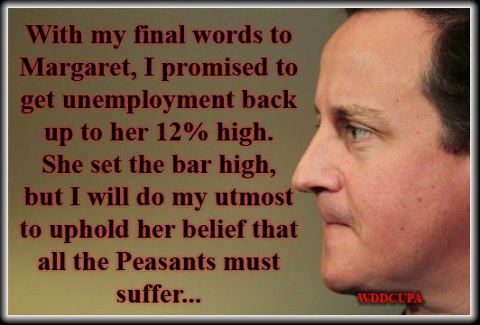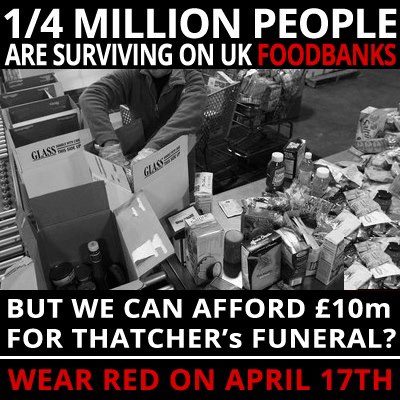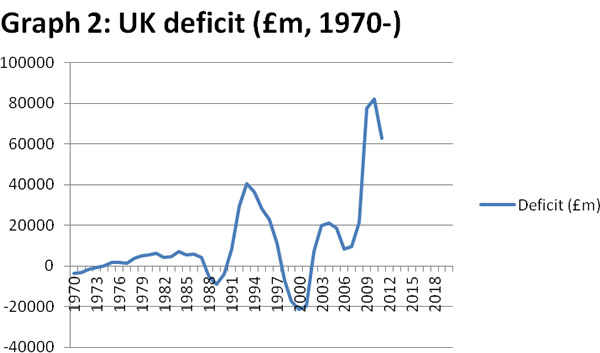http://www.huffingtonpost.co.uk/2013/04/17/unemployment-increases-70000_n_3098477.html?ref=topbar
Dawlish Discussion
Am I right in thinking that the national debt is increasing?
Lynnee, reducing the defcit is a cover for removing the State. And the welfare State.
Nice to see you're back with us MT (can't help noticing you share the same initials as........er........well, you know who).
Just so as we can all follow your train of thought, could you elaborate on your statement above please.
Thanks
@Lynne the graph above clearly shows that national debt is increasing.
However the deficit is reducing.
@Paul - which graph? the one you posted? it only shows the deficit (or am i missing something?)
and can you let us know,
1. Of any income, especially of the 'one off' variety that has helped reduced the deficit
and
2. Of the cut backs in public expenditure that has helped reduce the deficit.
And can you let us know 1) and 2) with a reasonable amount of detail (like don't just say by cutting back on welfare benefits), but give us examples of what and how much across the whole spectrum - eg defence spending, cuts in grants from central government to local government.
Also, if you could give us the link to whereever it was that you got the graph that you posted that would be very useful.
Ive posted this before and will post it again, this writer is a Tory
The deficit (or surplus) is the difference between income and expenditure. When there is a deficit, loans / selling bonds, etc are used to plug the gap which increases the national debt.
The graph above shows that recently the deficit has been reducing, proof that austerity is in fact working. However we have a very long way to go. Ideally we need a surplus to pay back the £1.2 Trillion that we owe.
So.......if, by its own admission, (see separate thread about 2011 leaked letter from Eric Pickles) the government knows that the consequences of the Welfare Cap may actually result in an increase in the amount of public expenditure rather than a reduction, why is the government still pursuing this line of attack on the poorest in our society?
How will such an increase in public expenditure help reduce the deficit?
One obvious reason for the welfare cap is
'principle of the Overall Benefits Cap on the grounds of fairness. It is not right that a household on benefit should receive more than the average working household.'
Another is that hopefully overall welfare expenditure will come down.
Alternatively we just keep giving so much money that people on welfare get more than working people. Which is clearly wrong.
I hope this is a joke - http://www.independent.co.uk/news/uk/politics/exclusive-labour-bets-the-house-with-pledge-to-outspend-tories-8579179.html
"Another is that hopefully overall welfare expenditure will come down"
Paul you are having a laugh if you believe that!!!!
I think it will work.
http://www.guardian.co.uk/society/2013/apr/15/benefits-cap-trial-London
Someone help me please. I'm trying to get my head around Paul's (and presumably the government's logic).
If ,by cutting welfare benefits, the consequences are that public expenditure increases to cope with the fall out of cutting those benefits then how on earth does that help reduce the deficit?
The numbers claiming, and the amount spent on, welfare benefits might indeed fall BUT what on earth is the point of that outcome if there is a consequential increase in public expenditure to cope with homelessness etc.?
What gets taken with one hand will just be handed back out, albeit in a different way, by the other.
And how many times Paul have you been told that millions of people who are working need to claim benefits in order to have enough money to live on. It is not only those who are not in work who claim benefits.
So I'll suggest another way to solve the benefit problem: Let's have plenty of jobs that are also well paid. That way more people can go out to work and the better paid they are the less they will need to claim housing benefit, tax credits etc. Those in work would also be better off than those out of work. But that is not all. Because more are in work and are earning a good wage there is a much higher tax revenue via income tax, VAT, stamp duty etc etc.
This would thus lead to a reduction in the deficit because 1. Less money being paid out whilst at the same time 2. there will be more money being paid in.
How's that?
Bravo Lynne, and they could start by building more Social Housing,new employment and would improve the economy, less money paid towards rent in the exhorbitant private sector. Also more people maybe able to downsize freeing up the larger houses for families. Simples!!!
Very laudable proposition, Lynne. But where are all these well paid jobs going to come from?
I am not the one suggesting there should be ample well-paid jobs. I would welcome clarification from where these jobs will come. The poster usually challenges others to supply facts and figures when a particular course of action is suggested, maybe she could do the same?
I dont understand everything to do with this countries deficit but I do understand what a lot of people are saying in the comments following this link
@burneside - the government getting infrastructure projects going like - houses, rail links, roads, etc
And that means spending lots and lots of public money, which we don't have. We have to live within our means.
I hear talk of a triple dip recession. Hardly an economic success story.
And how much public money have we just spent on a certain person's funeral?
Funny how money can just be found from out of the blue if deemed necessary by the powers that be.
You remember that 1979 Conservative bill board ad showing a snaking queue of unemployed persons with the tag line "Labour isn't working".
Well I think there now ought to be a Labour bill board ad showing exactly the same picture but with the words "Austerity isn't working" underneath.
(Note to self. Send that idea to the Labour party just in case they haven't thought of it)
Oh and by the way, you might like to take a look at the contents in this link.
http://www.bbc.co.uk/news/business-21860615
Seems I'm not the only one saying that capital expenditure might be good idea.
Well we know Labour will tempt the voters, with higher wages, higher benefits, more houses, more spending, more employment and unions can have what they ask. What a fantastic party, but they dont say how they will do it and where the money is coming from.
If they tax business more then the business people will simply move away. Then where is the money coming from to pay for the benefits?
I still think the Webmaster should have a 'politics' section ... I am sure people are bored stupid with the repetitve posts?.. all making the same point. Anyone would think Dawlish is a hot bed of politics within the Ciry of Westminster, but its only two people that constantly.post and keep on and on.
Wondering, are you saying that you've never, ever, made political comments on this website?
Is this what this Gov really wanted? http://www.huffingtonpost.co.uk/2013/04/20/benefits_disabled-man-nicholas-barker-welfare-reform_n_3121688.html?utm_hp_ref=mostpopular
Lynne .. I certainly have never started a post on Benefots etc, only responded, maybe responses should only be by yourself and Brazilnut.. The discussion board seems obsesed with politics and people must be sick and tired of it.
How about increasing the minimum wage to a living wage more tax less benifits.
I already know the reaction employers will make staff redundant but that was the argument put forward by the tories when labour introduced it a good hourly rate would incease spending bring in more tax revenue and less benifits would be paid out.
So wondering you want to live in your own little bubble oblivious to what is happening in this country, I hope karma comes back to bite you on the a......
another thing when you look on the discussion list avoid anything to do with politics as you put it, politics are in every walk of live. Its the same as people who complain about tv programmes and forget they have an off switch
from today's Independent:
George Osborne is under growing all-party pressure to boost housebuilding to kickstart the economy
Wednesday 24 April 2013

- George Osborne is under growing all-party pressure to boost housebuilding to kickstart the economy and create jobs after his March Budget was criticised as a missed opportunity to tackle the housing crisis.
The Chancellor is being urged to use his government-wide spending review in June to give the go-ahead to the building of up to 100,000 council and housing association homes to complement the help for home-buyers he announced in the Budget. Critics say he needs to increase the supply of homes as well as demand through the mortgage market.
The pressure increased after new figures showed that 2m council houses and flats have been sold since Baroness Thatcher introduced her flagship “right to buy” policy in 1980 – the same number of people now on local authority waiting lists for housing. Lord Oakeshott, the Lib Dem peer who obtained the figures by tabling questions in the Lords, said: “The Thatcherite council house sales crusade won the Tories millions of votes and costs taxpayers billions of pounds. It's imprudent housekeeping at its worst to flog off our social housing stock at taxpayer-subsidised discounts and then pay out £20bn a year to private landlords in housing benefit, often on the same resold properties.”
He added: “Social housebuilding has now almost ground to a halt. We must rebuild it by lifting the ban on councils borrowing to build, and guaranteeing institutional investment in housing association building on a massive scale. Or our economy will stay stagnant and 2m families will languish in housing need as Lady Thatcher's worst legacy.”
Lib Dem activists called at the party’s spring conference for an extra 100,000 council and housing association homes and Lib Dem ministers including Vince Cable, the Business Secretary, are sympathetic. Mr Cable sees the move as part of what he has described as a “Plan A plus” – sticking to the Coalition’s deficit reduction plan but taking bolder action to secure growth.
Figures published on Thursday will show whether Britain slipped into a “triple dip” recession in the first three months of this year. Although City analysts predict that Mr Osborne will narrowly avoid that embarrassing fate, they believe the economy is still flatlining and Lib Dems argue that more housebuilding would give it an immediate shot in the arm.
Labour is expected to fight the 2015 election on a pledge to bring in a huge housebuilding programme. Ed Balls, the shadow Chancellor, has called for the proceeds of the 4G mobile phone spectrum to fund the building of 100,000 affordable homes. The £2.3bn proceeds will be spent by 2015 so Labour may finance such a promise by higher borrowing.
Mr Osborne used his Budget to announce a £3.5bn Help to Buy scheme to help people buy new homes with a five per cent deposit and to guarantee another £130bn of new mortgages. But the independent Office for Budget Responsibility (OBR) said the measures would do little to boost the construction industry and were likely to inflate property prices, sparking fears of another housing bubble.
The cross-party Treasury Select Committee described as “unconvincing” the Chancellor’s assertion that his measures would trigger an increase in the supply of homes. It has demanded replies to 19 unanswered questions about them. Andrew Tyrie, the committee’s Tory chairman, said: “The Government’s Help to Buy scheme is very much work in progress. It may have a number of unintended consequences. Without further detail it is not possible to estimate its effects. The questions the committee has asked the Government need answering.”
Policy Exchange, which is regarded as David Cameron’s favourite think tank, is pressing the Government to increase housebuilding and expressed alarm that the number of housing starts fell by 11 per cent to 100,000 new homes last year. It fears that the Coalition is on track to see the lowest level of housebuilding since the 1920s.
The Office for National Statistics (ONS) revealed last week that home ownership has dropped for the first time in almost 100 years as people struggle to get a foot on the housing ladder. The number of owner-occupiers rose to a record 69 per cent but fell back to 64 per cent in 2011. The number of people renting their homes rose from 31 per cent in 2001 to 36 per cent in 2011 as many found themselves trapped in the rental market.
Report Post
Please Confirm
Details





 Please
Please